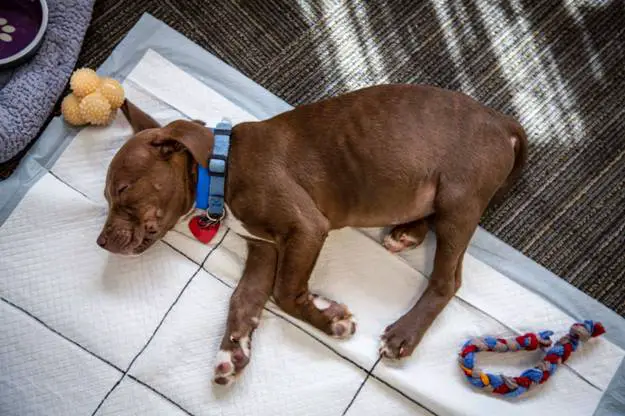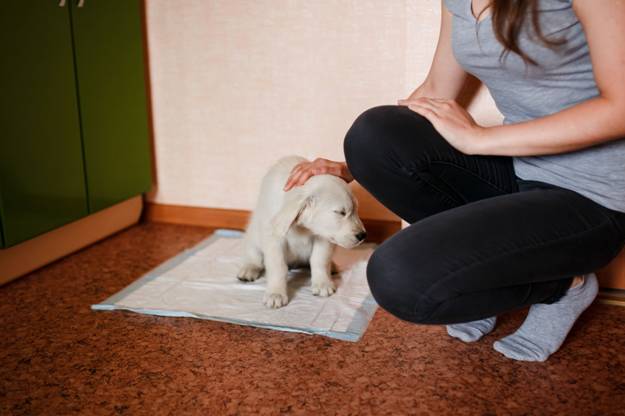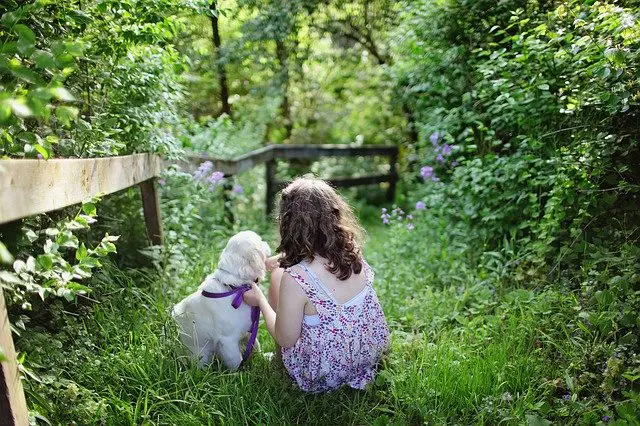You’re probably here because you have a puppy who seems to can’t stop wetting their bed. As a former puppy myself, I’ve been in your young pups position, and trust me, he feels worse than you do! If you’re wondering, “do puppies pee in their sleep,” I’ve got you covered.
My name is Ollie, and I’m a Beagle. When I was a puppy, I went through a phase where I would pee in my bed most nights. However, with a little care and patience from my owner, I was able to kick that habit and never turn back.
Today, I will talk about why puppies pee in their sleep, and what you can do to help your little buddy stop that habit and take control of his bladder.
Why Do Puppies Pee in Their Sleep?

If you have ever had a young pup, then you know that peeing in the house can be a common problem for dogs early on in their life.
If you just adopted your new best friend, and your young pup is peeing where they’re not supposed to from time to time, it’s really not anything that you have to worry about.
Inappropriate urination is only temporary at that age, and proper house training will kick that habit to the curb. Usually, if you train us young, we will stop this habit before we become adults.
Until we’re about four to six months old, our bladder muscles are not yet fully developed. This means that young puppies may struggle to go to the toilet outside in time, and will be unable to hold their urine for long periods of time.
However, even if you continue to find pee puddles around the house from time to time (accidents happen!), understand that as dogs, we eventually learn to prefer to urinate away from where we sleep. When inappropriate urination becomes the biggest problem is when your puppy continuously pees in their sleep.
If peeing in the bed continues to be a problem as your puppy gets older, or they are not responding well to being potty trained, a puppy peeing in their sleep might be a sign that something is wrong, whether it be a health issue or a problem in their routine.
Some of the reasons your puppy could be peeing in their sleep include: a weak bladder, a urinary tract infection, kidney disease, spinal cord disease, or recovery from a recent spay or neuter procedure.
Let’s take a closer look at some of these causes.
Urinary Tract Infections (UTI)
One of the most common reasons for inappropriate urination in dogs of any age is a urinary tract infection, or UTI as you humans like to call it. We don’t like having them any more than you do.
Although UTIs are more common in older female dogs, dogs of any age can realistically develop a UTI, even puppies.
Signs of a UTI in your puppy include blood in the urine, dripping of urine, or frequently licking genitals because they are sore. None of these are good signs of anything, so please address the problem as soon as you notice this behavior.
For any dog that develops a UTI, take us to the vet as soon as you can. The vet can perform a urinalysis to help determine whether your dog has a UTI or not. This is a routine test that reports the properties of your puppy’s urine. If there is a different condition causing your puppy’s incontinence, urinalysis can help to rule out a UTI or kidney problem.
If the vet says that it is a UTI, then they will give you antibiotics to help your dog recover.
UTIs are not the only urinary tract issue that we are susceptible to developing, There are various other urinary tract issues that your dog may have as well, including:
- Inflamed bladder
- Kidney disease
- Bladder stones
- Crystals in urine
- Tumors
These issues can all make us dogs very uncomfortable, which may lead to peeing at inappropriate times in inappropriate places. Luckily, these issues are very uncommon in puppies, and most of these issues can be solved by a quick trip to the vet and prescription for some medication. However, in extreme cases such as tumor or bladder stones (ow!), surgery may be necessary. Let’s hope it never gets to that point!
Spaying/Neutering
Getting neutered is no fun for any puppy, and it can result in a few side effects, including incontinence.
If you recently spayed or neutered your puppy, that could be the reason that they are peeing in their sleep. When a puppy is spayed, a rapid change in hormones occurs, which causes the urethral sphincter to relax and release urine involuntarily, especially when they’re at rest. Poor puppy!
Luckily, this behavior usually only lasts for 10-14 days, so there is no need to worry. During this time, continue to potty train your puppy and teach him to pee outside.
If the problem persists beyond the 14 days, then your puppy might have another health problem, or there may be further complications from the neutering procedure. Take him to the vet to get checked out as soon as possible.
Nightmares
Us dogs are more like you humans than you might think. We dream, just like you do, and sadly, we also have nightmares.
Maybe we’re dreaming that you abandoned us, or maybe we’re reliving a traumatic experience that we had. Either way, nightmares can be scary for puppies and cause all types of reactions.
You might notice your puppy twitching or whining in his sleep. Maybe even growling a little louder than usual. These are all signs that your puppy may be experiencing a nightmare, which may lead to peeing while they sleep.
If your puppy seems to be having nightmares that aren’t going away, you can bring them to the vet to see if behavioral therapy or medication can help.
Incontinence
Incontinence is typically a problem in older dogs, but puppies can also be susceptible to the condition, especially if they’re in poor health.
If you find that your puppy is specifically peeing in their bed at night, and not in different areas of the house, it is most likely due to incontinence.
If incontinence is the cause of your puppy peeing in their sleep, it’s important to understand that they have no control of what is happening and it isn’t their fault. Luckily, just like a UTI, incontinence can usually be treated with medication.
Insufficient Exercise
Puppies who are being pottery trained are learning that they can only go pee outside. So if these young pups are not brought outside often enough, where do you think they will pee?
You might be bringing your puppy outside in the morning and the afternoon, but that is often not enough. It is very uncomfortable for us dogs to have to wait until the following morning to be able to urinate again!
Likewise, puppies are usually a ball of energy, and they need opportunities throughout the day to let that excess energy out. If not, this may trigger a state of discomfort and stress.
Try bringing your puppy on a nightly walk to give them one more chance to relieve themselves before bed.
What To Do if Your Puppy Pees in Their Sleep

Once you recognize that your puppy is peeing in their sleep, you will want to address the problem right away.
Depending on what is causing them to urinate at night, you have a few options when it comes to helping your pup through this difficult time.
More Potty Breaks
As dogs, we depend on you to make sure that whenever we need to go, we have the opportunity to go. This is especially true for puppies, who may not have full control of their bladders yet. Make sure to take your puppy outside to pee right after he eats, drinks, or wakes up from a nap.
You should be walking your puppy at least 3 times a day in order for him to be getting the right amount of exercise, as well as a decent amount of potty breaks. Anything less may lead him to hold in his pee, or end up peeing in his sleep
Reward your puppy every time he goes outside to pee. Treats definitely help us remember better!
Go To the Vet
If after everything, your puppy continues to pee in their sleep, it’s best to take them straight to the vet.
If the vet determines that your pup just has a weak bladder, at least you know that, like most of us, they will grow out of their incontinence. Also, treating an underlying condition as quickly as possible will prevent any further health problems and potentially stop your puppy from becoming sick
Make Sure You Clean Up!
Until you get to a vet, make sure that you keep up with cleaning and replacing your puppy’s bedding. Believe me, not only can a wet bed be uncomfortable, but it can create a breeding ground for bacteria. If your puppy doesn’t already have an infection, they might catch one from dirty bedding!
Don’t Hit
I know how frustrating it could be to wake up to find out that we peed our bed for the third time, but please don’t hit or yell at us!
Yelling makes some puppies think that humans are hostile, unsafe and unpredictable. As a result, your puppy may begin feeling afraid to urinate in front of you, indoors or outdoors. Then they will still pee in the house while you aren’t watching, meaning your plan will have backfired!
Please, do not discipline your puppy if they pee in the bed. If we’re peeing in our bed, it isn’t our fault since we probably don’t even realize what we’re doing. We learn best with patience and care.
Potty Training Tips Puppies

Potty Training is the best way to stop puppies from peeing in their sleep. If you potty train your puppy for weeks and you still wake up finding him in wet bedding, you may have to change the way that you might have to change your method!
Keep Trying
They say you can’t teach an old dog new tricks, but you have to teach a young pup the same trick again and again before they get it!
As dogs, sometimes we need a reminder of what we’re supposed to do and how we’re supposed to act. This is especially true if we are brought into a new environment, such as puppies.
When you adopt a puppy, they may be shocked in a new environment. I know I was! Sometimes they need a little extra time to get used to new habits, such as house training.
If your new puppy is peeing in their sleep, but seems healthy otherwise, try giving them some extra time to understand what you teach them before thinking that they will never get it.
Keep a Schedule
Dogs are creatures of habit, and their bodies often adapt to the schedules you set for us. For example, if we are used to going for a walk in the morning and in the afternoon, we will know that those are the two times that we can go outside and pee. If you abruptly change that schedule, we may have trouble adapting, causing accidents indoors to happen.
This is especially crucial for puppies who are just learning new habits. Observe your puppy to make sure that the schedule you’re establishing is working for him. Modify it if necessary, but once he gets used to it, avoid switching it up too much.
Helping Puppies Who Pee In Their Sleep
It’s never fun when us dogs pee where we’re not supposed to, but it isn’t the end of the world when puppies pee in their sleep.
A one-off accident is not any cause for concern, and it may take a while for a new puppy to get used to a potty schedule, so don’t give up!
If you try potty training a puppy for months and they’re still peeing in their sleep, there may be a more serious health issue. Take them to the vet as soon as possible to get checked out.
Well that’s it, human! I hope that you learned why your puppy pees in their sleep, and are ready to help him kick the habit!
